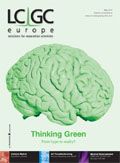Event News
The International Symposium on Chromatography (the ISC Symposium) is one of the top international congresses in separation science. With the first symposium held in London in 1956, this conference is the oldest series of scientific meetings devoted to the field of chromatographic science.
ISC 2010
The International Symposium on Chromatography (the ISC Symposium) is one of the top international congresses in separation science. With the first symposium held in London in 1956, this conference is the oldest series of scientific meetings devoted to the field of chromatographic science. It is an international forum for scientific discussion about all chromatographic methods, along with combined techniques, such as multidimensional chromatography coupled to mass spectrometry or NMR, automation and miniaturization. The symposium is held biannually in European countries.

Martin Child/Getty Images
The 28th International Symposium on Chromatography (ISC 2010) will take place in Valencia (Spain) at the Faculty of Pharmacy in the campus of Burjassot of the University of Valencia, from 12–16 September 2010 and will consist of invited lectures by scientists at the forefront of the field, oral contributions organized in parallel sessions and poster presentations. Workshops, seminars and short courses given by experts in this field will also be a part of the Symposium programme and will offer an excellent opportunity to learn about most recent scientific and technological developments in separation science. Methods and applications to be presented at ISC 2010 include: fundamentals on chromatography; gas chromatography; liquid chromatography; multidimensional chromatography; hyphenated techniques; fast separations; column technology; electrodriven separations; supercritical fluid chromatography; enantioseparations; new detection methods; nanotechnology; industrial processes and product analysis; environment; speciation analysis; food quality and safety; clinics and pharmaceutics; life sciences/bioanalysis; forensics; and polymers.
Workshop-seminars of instrument manufacturers and an extensive exhibition of instrumentation, accessories and supplies will run in parallel to the scientific programme and will display the latest innovations in the field of instrumentation, column technology, sample preparation, software tools and related subjects. Important dates to consider are 30 May 2010: The deadline for oral and poster contributions; 30 June 2010: Notification of acceptance/rejection; 15 July 2010: Deadline for last minute posters and early bird registration.
For more information please visit the event website at http://www.isc2010.eu/ or e-mail: isc2010@geyseco.com
19–24 June 2010
HPLC 2010
Hynes Convention Center & Sheraton Boston Hotel, Boston, USA
Contact: Renee Olson
Tel: +1 510 428 0740
E-mail: rolson@casss.org
Website: www.hplc2010.org
6–10 September 2010
16th International Symposium on Separation Science
Conference Halls of the National Research Council (CNR), Rome, Italy
Contact: Danilo Corradini
Tel: +39 069 067 2254
E-mail: rome.2010@mlib.cnr.it
E-mail: danilo.corradini@imc.cnr.it
Website: www.16isssrome2010.it
15–16 September 2010
SFC 2010 — 4th International Conference on Packed Column SFC
Radisson Blu Royal Viking Hotel, Stockholm, Sweden
Contact: Todd Palcic
Tel: +1 412 805 6296
E-mail: register@greenchemistrygroup.org
Website: www.greenchemistrygroup.org
Send your event details to Doug Kitson at dkitson@advanstar.com
Measuring Vitamin K1 Concentrations in Dogs with Chronic Enteropathy Using LC–MS/MS
May 14th 2025A joint study between the University of Tennessee (Knoxville, Tennessee) and the University of Pennsylvania School of Veterinary Medicine (Philadelphia, Pennsylvania) compared directly measured vitamin K1 (vitK1) concentrations in healthy dogs and dogs with chronic enteropathy (CE) using liquid chromatography tandem mass spectrometry (LC–MS/MS); they also investigated whether supplementation of vitK1 in dogs with CE would significantly increase vitK1 concentrations.
HPLC 2025 Preview: Fundamentally Speaking (Part 2)
May 14th 2025Michael Lämmerhofer from the Institute of Pharmaceutical Sciences, University of Tübingen, Germany, spoke to JFK Huber Lecture Award winner of 2024 Torgny Fornstedt, professor in analytical chemistry and leader of the Fundamental Separation Science Group, Karlstad University, Sweden, about his pioneering work in high performance liquid chromatography (HPLC) with a focus on fundamentals, ion-pair chromatography, and oligonucleotide applications.

.png&w=3840&q=75)

.png&w=3840&q=75)



.png&w=3840&q=75)



.png&w=3840&q=75)











